Tom Stoppard’s 1982 play The Real Thing pulses with exhilarating ideas about how to really love and how to write about love, about good writing, propaganda, and the sacred power of words. It discusses ‘the real thing’ not only in love but in politics and music, and it plays clever metatheatrical games with the theme of reality and artifice.
Stoppard and probing ideas go hand in hand, of course. His plays embrace complex themes and concepts about everything from Dadaism to English landscape gardening. But while always thrillingly smart, many of his early dramas were perceived as impersonal, and lacking in humanity.
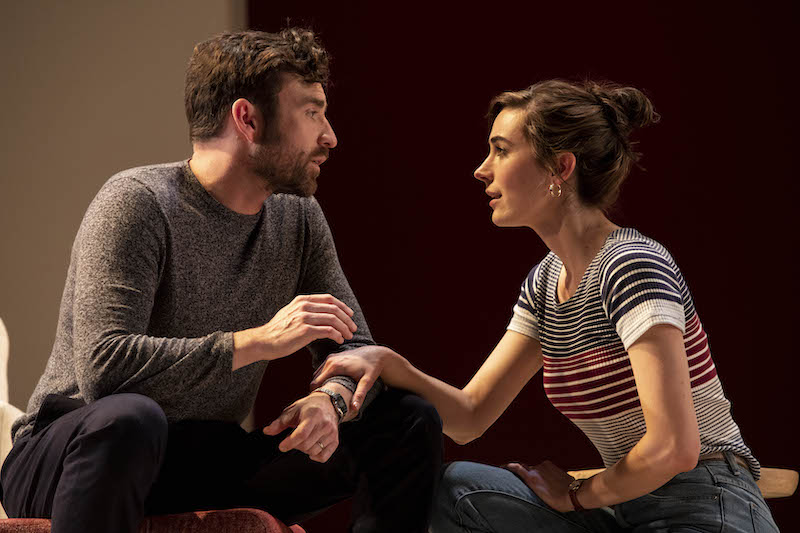 Johnny Carr and Geraldine Hakewill. Photograph © Lisa Tomasetti
Johnny Carr and Geraldine Hakewill. Photograph © Lisa Tomasetti
The Real Thing was famously the first play where Stoppard wrote from the heart about love, pairing his customary cerebral panache with genuine emotion. Times have changed, views have slightly shifted, and a few of Henry’s comments do sound a bit dated now, but the emotion at the heart of the play still rings very true in this superb Sydney Theatre Company production directed by Simon Phillips.
Entering the theatre, the stage looks surprisingly bland, with a fawn, panelled wall along the back and windows above it – a blank canvas about to burst into life. To the strains of Blondie’s Heart of Glass (with its reference to “the real thing”), the wall parts, a revolving stage spins, other panels slide into place and a room appears. Ingeniously designed by Charles Davis, set changes like this happen in an instant throughout the play.
The plot of The Real Thing centres on Henry, an erudite playwright who knows how to make words “go on replicating themselves like a spiral of DNA”. His razor-sharp repartee is effortless and witty, but he uses that to deflect emotion. In the play, we watch him move from being “a reflex joke machine” to finding a deeper self-awareness.
Married to actor Charlotte at the start of the play, Henry leaves her for another actor, Annie, who has taken up the cause of Brodie, a soldier and anti-nuclear demonstrator who has been imprisoned for setting fire to the wreath at the cenotaph. Henry is utterly smitten with Annie. So why does he struggle to write a play for her? And how will he cope when he discovers her infidelity?
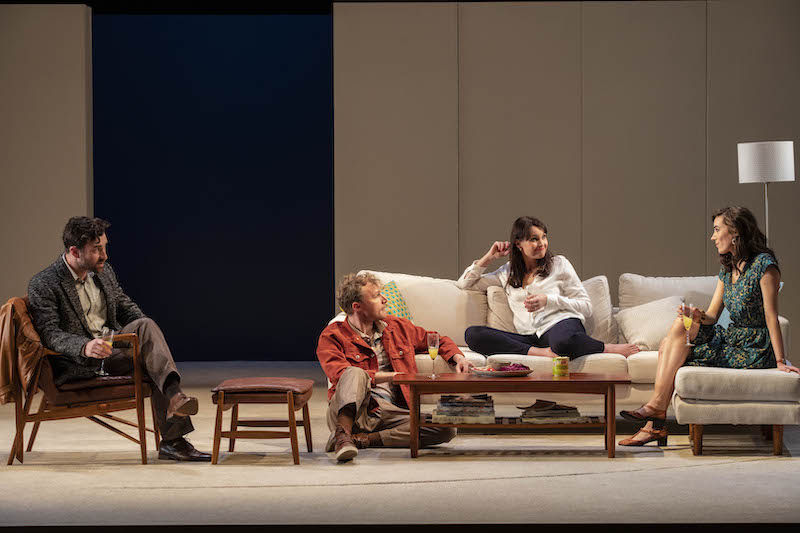 Johnny Carr, Charlie Garber, Rachel Gordon and Geraldine Hakewill. Photograph © Lisa Tomasetti
Johnny Carr, Charlie Garber, Rachel Gordon and Geraldine Hakewill. Photograph © Lisa Tomasetti
The Real Thing may not be autobiographical, but Stoppard has acknowledged that Henry’s opinions are his, and he gives the character some eloquent, memorable speeches about writing and the power of words. In one, he uses a cricket bat and a block of wood as a brilliant analogy for good and bad writing.
Henry also loves certain pop songs such as The Crystal’s Da Doo Ron Ron, which he finds as moving as “real music”, and there are some lovely musical moments, from Bach versus Procul Harum’s A Whiter Shade of Pale, to Henry’s story about being taken to see Maria Callas to cure him of his “strange disability”.
Though it’s obvious that Henry’s opinions hold sway in the play, Stoppard gives the other characters articulate arguments with which to counter him. Brodie is “a lout with language”, says Henry, when Annie asks him to rewrite Brodie’s clunky television play. At least he has something real and serious to say, fires back Annie. Nor is the argument about fidelity and love ever black and white. Brodie does get the short stick at the end the play, however, making him too easily dismissed.
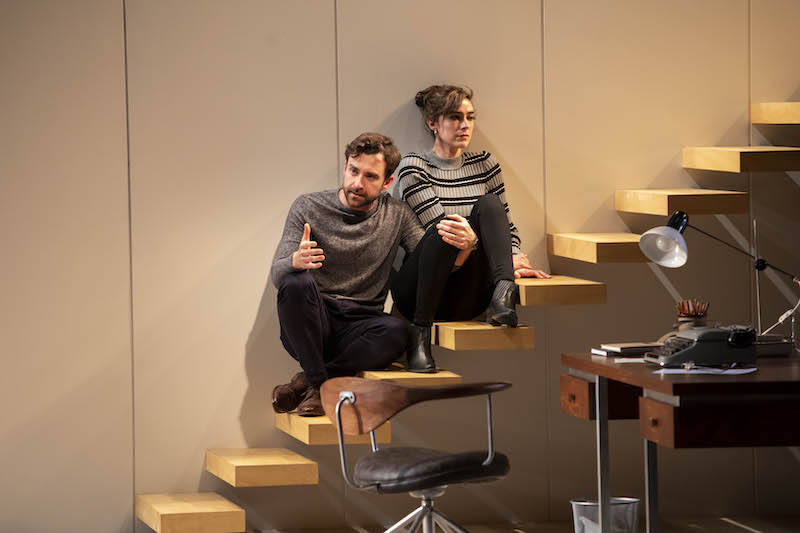 Johnny Carr and Geraldine Hakewill. Photograph © Lisa Tomasetti
Johnny Carr and Geraldine Hakewill. Photograph © Lisa Tomasetti
Throughout the play, Stoppard references Strindberg’s Miss Julie and John Ford’s ‘Tis Pity She’s a Whore to illuminate his exploration of Henry’s gradual emotional awakening. Since several of the characters are actors, he is also able to echo and reflect scenes from Henry’s play House of Cards, as well as weaving in the story of Brodie meeting Annie, which Brodie uses in his television play. It keeps the structure of The Real Thing surprising and invigorating, while exploring the theme of reality and artifice.
Simon Phillips directs the play with huge intelligence and warmth. The production flows seamlessly on Davis’s sophisticated set, beautifully lit by Nick Schlieper. The 1980s setting is retained, but the costuming is understated and never reeks of period choices for the sake or fun of it.
The opening, Cowardesque scene – in which a husband believes he has discovered his wife’s infidelity – feels rather awkward. We will discover the reason for this later, but even so the acting still feels a tad too mannered. From there, the production takes a scene or two to find its natural rhythm, but once it does it whisks you into its world, thrilling with the exhilaration of the writing (which becomes more emotional as the play progresses) and the emotional depth of the central performances.
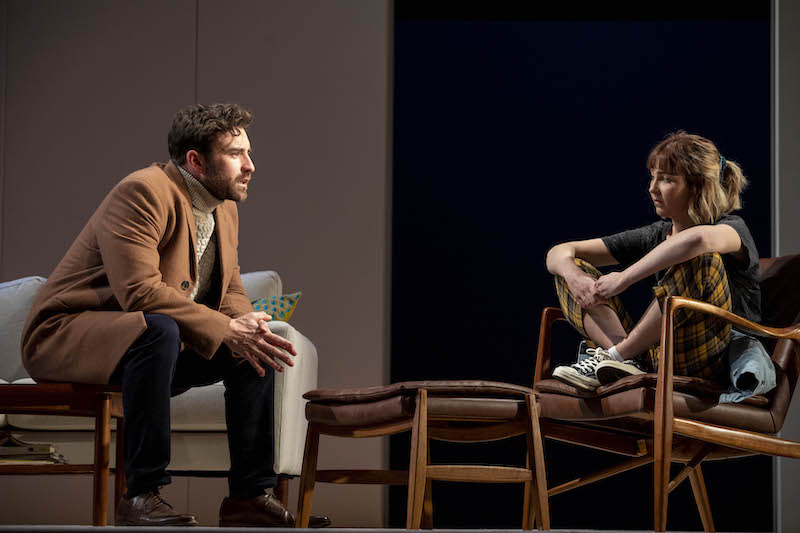 Johnny Carr and Julia Robertson. Photograph © Lisa Tomasetti
Johnny Carr and Julia Robertson. Photograph © Lisa Tomasetti
Johnny Carr is a revelation as Henry. It’s not an easy role but his dramatic arc from suave, arrogant, smart-arse to bereft lover is brilliantly done, and you believe every emotion as he struggles with the pain of raw, messy love. He manages to make the character appealing throughout, serving up his witticisms with elegant ease, and he handles the famous speeches, like the cricket bat analogy, with as much truthfulness as cocky aplomb. When the reality of Annie’s infidelity hits home, there’s a moment where you watch the pain slowly etch its way across his face, and your heart bleeds for him.
Geraldine Hakewill is the perfect match as Annie. An actor with access to great vulnerability and honesty, she can be fierce when necessary but you are always aware of the emotion beneath, and even when she is just listening she is utterly within character. There is plenty of sexual chemistry between the two of them and the productions shines most brightly when the two of them are together on stage.
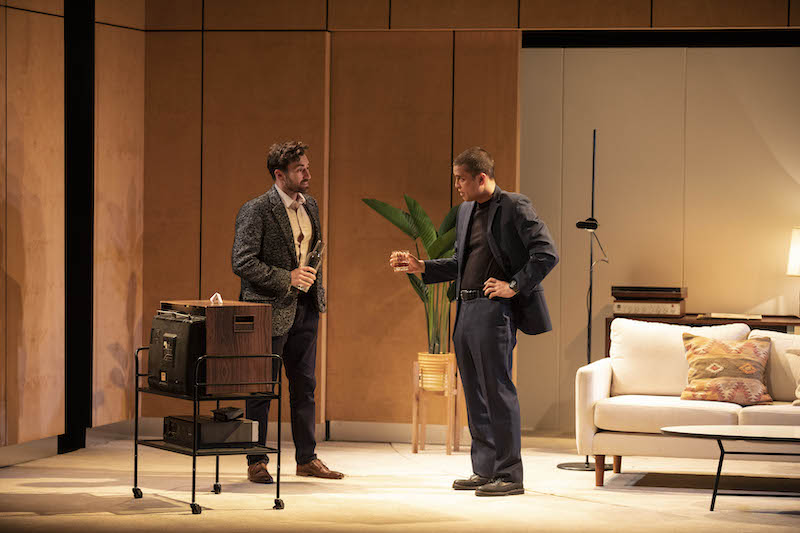 Johnny Carr and Dorje Swallow. Photograph © Lisa Tomasetti
Johnny Carr and Dorje Swallow. Photograph © Lisa Tomasetti
Rachel Gordon as Charlotte and Charlie Garber as Annie’s husband Max struggle a little in the opening scene, but Gordon subsequently brings plenty of vitality to the sardonic Charlotte, while Garber is convincingly hysterical when Annie drops him. Julia Robertson is luminous as Charlotte and Henry’s precocious, worldly-wise 17-year daughter Debbie who sees Henry’s play House of Cards as the fluff it is. Shiv Palekar gives a playful performance as Billy, the young actor who seduces Annie, and Dorje Swallow is impressive as the tough, opportunistic, working-class Brodie who appears at the end of the play, making his mark in the few minutes he is given.
Directed by Phillips, with Carr and Hakewill exceptional in the central roles, The Real Thing is the real deal, and a richly rewarding night of theatre.
The Real Thing plays at the Drama Theatre, Sydney Opera House until October 26











Comments
Log in to join the conversation.